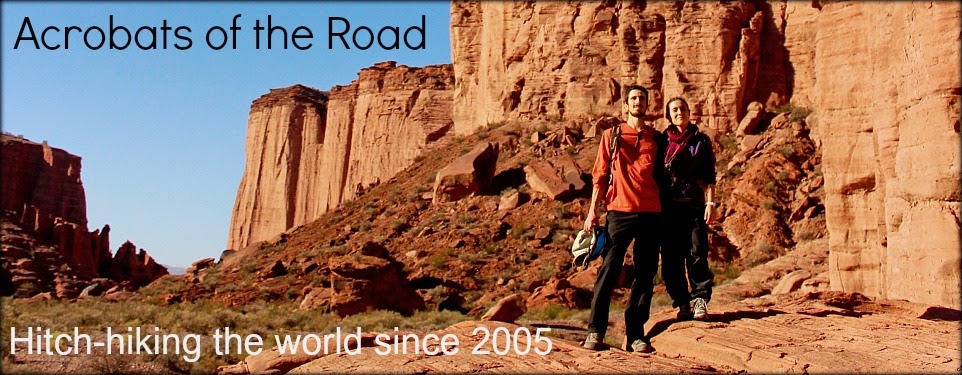Week number 7, country n.10, city n.22, car n.100. The week started with my arrival to Dresden, in Saxony, Germany, famous for having been reduced to rubbles in a febraury noght of 1945, in which the most devastating conventional bombing in history. During DDR times the area was known as “the valley of the people who don’t know”, due the city’s to deep location to receive western TV waves. In Dresden I was waited by Veit, founder of Hospitality Club, a free accomodation exchange website with 60,000 members worldwide. That explains why I don’t use hostels and people is waiting for me in every city I go. It’s two years since argentinian backpackers organized in http://www.autostopargentina.com.ar/ have been pushing the Club in the latino web space, so meeting each other in the real world was something in the to-do list. Since both of us were quite busy with web-related projects we quickly adopted a rutine. We would wake up and turn our laptops on even before thinking in breakfast. This rutine had two major exceptions. The first when a heat wave pushed Veit out of his bunker and onto his grandmas’s pool. Surprise for me, shameful latin in a land of retired hippies, his gradnma was a fierce naturist and didn’t allow anyone to walk into her house with shoes, or into the pool with bathing clothes. The second time off was going to the Altstadt to see Argentina- Germany match. The Dresden Altstadt, or Old Town, is only now completely rebuilt after 50 years of looking like an abbandoned building site. In the bar all they were all germans, so I had to wait for the goals to unveil my small argentinian flag.
I arrived to Dusseldorf on Wednesday. Dusseldorf is one of the cities of the famed Ruhrgebiet, heart of german steel industry until the 50s, an amazing net of urban tissue in which no less than 10 cities have over-fenced their neighbours to become just one big amorphous mega city of 7m people. I was taking there by a bussinesman anxious to change his life. We talked about time management in our lives, He said: “Death is a good consultant” when I suggested the idea that, if given 24 hs left to live we would reconsider the way we used our time. Sanna waited for me in Dusseldorf, a swedish student that lived in a students resident with other connationals. I had to enter and leave the premises using the backdoor. The girls at the nicknamed “swedish embassy” were keen on preparating a midsummer party-bbq to celebrate the longest day of the year, loyal to that nordic costume of feeling grateful to life whenever temperature reaches 21 degrees. The celebration consisted in, according to Sanna’s words, dancing like froggs around the middsummer tree, actually a wooden cross festooned with leaves and flowers. With such a program who would even think in the cinema… Iy’s the kind of activities which I regard as extremely important and worthy of all international cooperation, so next night we were roaming the Rhein’s shores in our bikes and depredating its flora (tradition said no less than 7 different flowera should be part of the ornates). Sanna had already sketched the midsummer tree, and with that IKEA-spirit the tree was rady the following morning. Just that it was actaully a cross. “And how do we carry the so-heavy cross on our own?” I was easy prey of the persuation that a couple of swedish barbies can operate on a southern man, and not that I give any religious connotations to my trip, but midday found me crossing Dusseldorf’s downtown with the cross on my back. Some women made the signal of the cross, all the cars gave way, everything but the printed towel trick. In the Rheinpark the girls said here and we hammered the cross to ground. If the scene seemed an anachronic christianazation of the germanic lands, when the rest of the swedish comitee arrived with salmons, herrings and beers it was clear it was about about partying. Soon they started to dance around the decorated cross. And yes, I had to dance like a frog. Some Hospitalitu Club members in Dusseldorf also turned up in the party, really interested to photograph HC peace flag number 3, which I am carrying aroun. It seemed they had bid with HC members of some other german city that they would receive one the flags before them. In the gropu there was also a guy from the US and a girl from Poland.
On Saturday I left for Delft, Holland, where Stephen was waiting for me. Stephen is a Dutch hifric engineer that drinks mate and sings cumbia perfectly. Terrible what the argentinian virus has done to european backpackers. Five months in Tapalqué were enough for Stephen. I found him in a regretable condition, his shelf stocking packs of Rosamonte yerba mate. The trip to Delft was a bit complicated in the beginning, due to the density of cities in the Ruhr area and I have to admit that I got the forst ride in the wrong direction, to Bochum. But I was lucky and the second driver took me to the German border in Venlo, even if he was traveling nowhere. During this week my finnances recovered a bit, thanks to my friends and HC members. Some day I manages to spend 0, and that’s good after the devastating effects the Calais robbery had on my wallet.
